Dvije sirote/Dvije sirotice/The Two Orphans is a silent film, made in the former Kingdom of Serbs, Croatians and Slovenes, now Croatia. The film, directed by Alfred Grinhut a.k.a. Alfred Grünhut, was produced in 1918 by Croatia Film and distributed in 1919 by Jugoslavija Film in Zagreb. The film is considered lost. The rare, sepia postcards used for this post are from the collection of Ivo Blom. The film was based on the famous French play Les deux orphelines by Adolphe d'Ennery and Eugène Cormon (1874), which was adapted many times for film - the most famous one being D.W. Griffith's version Orphans of the Storm (1921). Dvije sirote stars Zorka Grund, playing both orphans. Other actors are Zorka's father Arnošt Grund, August Cilić, Ervin Vilković, and director Alfred Grünhut.
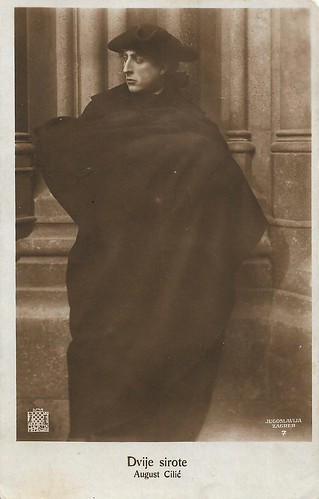
Former Kingdom of Serbs, Croatians and Slovenes (now Croatian) postcard by Jugoslavija Film, Zagreb, no. 7. August Cilić in Dvije sirote/Dvije sirotice/The Two Orphans (Alfred Grinhut a.k.a. Alfred Grünhut, 1919).
August Cilić (1891-1963), was a Croatian actor, comedian and director of the Croatian National Theatre in Zagreb, and the Croatian National Theatre in Varaždin.
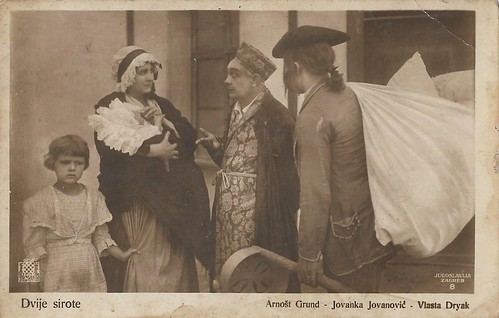
Former Kingdom of Yugoslavia (now Croatian) postcards by Jugoslavija Film, Zagreb, no. 8. Arnošt Grund, Jovanka Jovanovic and Vlasta Dryak in Dvije sirote/Dvije sirotice/The Two Orphans (Alfred Grinhut a.k.a. Alfred Grünhut, 1919).
Tenor and actor Arnošt Grund (1866-1929) was born and educated in Prague. In 1895, Stjepan Miletić brought him to Zagreb. There, he fell in love with Croatian art, and remained in Zagreb until his death. Grund was a pioneer of the Croatian cinema, working as actor, screenwriter and director. Jovanka (Ivanka) Jovanović (born Dvorniković) (1887-1963) was a Serbian-Croatian actress. Vlasta Dryak (1911-2006) must have been just a child of 7 or 8 when she played in Dvije sirote. When she was 21 she became a stage actress and was successful at the Croatian National Theatre.
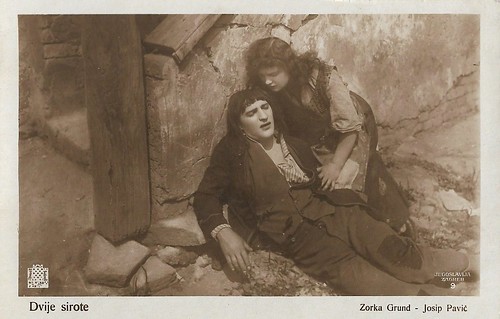
Former Kingdom of Yugoslavia (now Croatian) postcards by Jugoslavija Film, Zagreb, no. 9. Zorka Grund and Josip Pavic in in Dvije sirote/Dvije sirotice/The Two Orphans (Alfred Grinhut a.k.a. Alfred Grünhut, 1919).
Zorka Kremzar, born Zorka Grund (1900-?), was a Croatian film actress. She was the daughter of Arnošt Grund, a director of the Czech origin, and sister of Milada Grund, who performed under the pseudonym of Milada Tana. Zorka Grund later became a filmmaker, according to Croatian sources.
Josip Pavic (1887-1936), born in Trasnik (Bosnia and Herzegovina) was a stage actor, primarily performing at the Croatian National Theatre in Zagreb, Croatia, where his bronze bust is featured in the grand hall. While he was a renowned actor in many roles, his most famous role was as Hamlet. With other actors, he helped to build the 2nd instalment of the National Theatre, located in Split, Croatia. In 1919 Pavic acted in five silent films, among which Dvije sirote and Vragoljanka. In 1936 Pavic died in Zagreb from cirrhosis of the liver and heart failure. His funeral was attended by hundreds of his fans.
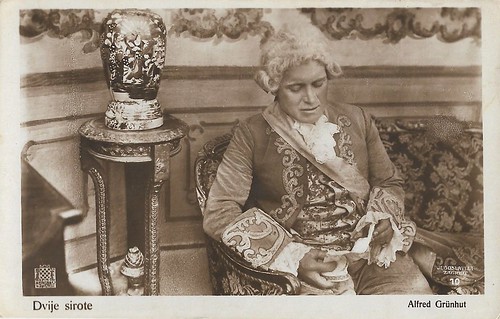
Former Kingdom of Yugoslavia (now Croatian) postcards by Jugoslavija Film, Zagreb, no. 10. Alfred Grünhut in Dvije sirote/Dvije sirotice/The Two Orphans (Alfred Grinhut a.k.a. Alfred Grünhut, 1919).
Alfred Grinhut or Alfred Grünhut (1882-1946) was a Croatian and Yugoslav actor and director, known as the author of two films lost today: Vragoljanka (1919) and Dvije sirote (1919), in which he also acted. He also acted in Brisem i sudim (Arnost Grund, 1919) and Dvorovi u samoci (Tito Strozzi, 1925) too.
As Croatian film historian Dejan Kosanovic indicates in his study Kinematografija i film i Kraljevini SHS/Kraljevini Jugoslaviji 1918-1941 (2011), domestic film production in Croatia started during the First World War.
In 1917, Hamilkar Bošković and Julien Bergmann founded the first Croatian film company, Croatia. They engaged Croatian actors and directors and Austrian technicians. The first Croatian film director was Joseph Halle, who made most of the films of the Croatia company. At the end of 1918 Bošković and Bergmann sold their rights to the new company Hermes or New Croatia, which was active until 1920.
Early 1919, Hamilkar Boskovic founded with Theodore Milic the company Jugoslavija Film. April 1919 Milic was in Paris and bought Pathé cameras and equipment. Among the film company members were three actors of the National Theatre, Alfred Grünhut, Tito Marquis Strozzi and Dragutin Horvat. Alfred Grünhut (1882-1946) had already directed two films and played in several other films of the former Croatia film company.
The first and very ambitious project of Jugoslavija Film was the film Brišem i sudim/B. and the judge, a grand melodrama for which the scenario was written in Slovenian and Croatian by theatre actor and director Ignjat (Ignatius) Borštnik (1858-1919), who also played the main role in the film. The director was Arnošt Grund (1866-1929), a Czech theatre actor and director who lived and worked in Zagreb since 1895, while the cameraman was one of the pioneers of the Austrian film Ljudevit Šašek (Ludwig Schaschek).
The scenographer for Brišem i sudim/B. and the judge was the Zagreb painter Otto Antonini (1849-1937), whom Jugoslavija engaged as a painter of sets and props. He also painted the decorations for film posters and for interiors in the films, and he produced the trademark of the company - three girls holding the coats of arms of Serbs, Croats and Slovenes.
As Brišem i sudim was successful, soon more films of Jugoslavija followed, such as Jeftina košta (Arnost Grund, 1919), based on a script by Grund and filmed by Schaschek, and U lavljem kavezu (1919), scripted and directed by Arnošt Grund. Jugoslavaija also distributed films by others, such as those by the Austrian company Sascha-Film.
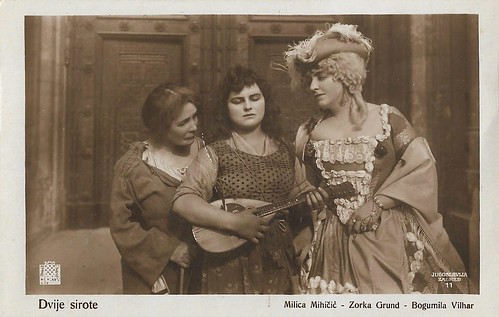
Former Kingdom of Yugoslavia (now Croatian) postcards by Jugoslavija Film, Zagreb, no. 11. Milica Mihicic, Zorka Grund and Bogumila Vilhar in Dvije sirote/Dvije sirotice/The Two Orphans (Alfred Grinhut a.k.a. Alfred Grünhut, 1919).
Bogumila Vilhar (1882-1962) was a Croatian stage and screen actress. From 1905, she continuously acted at the Croatian National Theatre, apart from breaks at Osijek (1919-1921) and Split (1922-1924). She played in Shakespeare and Schiller classics and also in many plays by domestic authors. Vilhar is also known for the film Lisinski (Oktavijan Miletic, 1944), a biopic of Croatian composer Vatroslav Lisinski.
Milica Mihičić (1864-1950) first appeared on stage in 1890 in Zagreb, where she acted as an extraordinary actress for the following 50 years. At the beginning of her career she performed in various roles in dramas, ballet and operettas. She continued as an actress in French Salon prose theatre. Her second vocation was the psychological realistic drama. Mihičić appeared also in the film Dama sa crnom krinkom/The Lady with the Black Curse (1919).
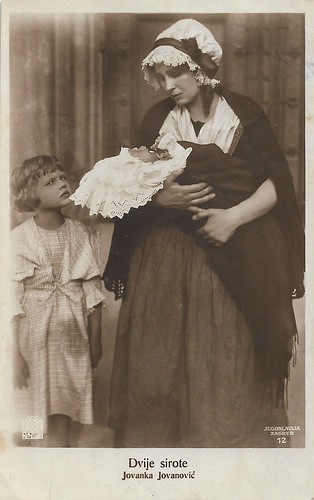
Former Kingdom of Yugoslavia (now Croatian) postcards by Jugoslavija Film, Zagreb, no. 12. Jovanka Jovanovic and Vlasta Dryak in Dvije sirote/Dvije sirotice/The Two Orphans (Alfred Grinhut a.k.a. Alfred Grünhut, 1919).
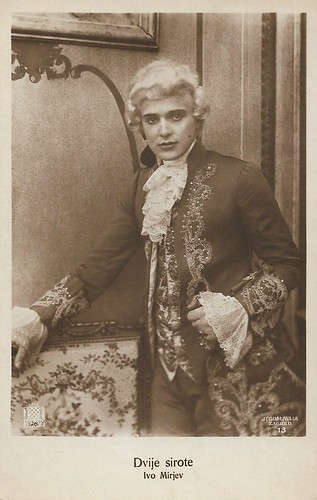
Former Kingdom of Serbs, Croatians and Slovenes postcard by Jugoslavija Film, Zagreb, no. 13. Ivo Mirjev in Dvije sirote/Dvije sirotice/The Two Orphans (Alfred Grünhut, 1919).
Ivo Mirjev aka Ivan Mirjev and Ivan de Dominis-Mirjev (1894-1967) was a Croatian actor and theatre director.
Dvije sirote/The Two Orphans (Alfred Grünhut, 1919) is based on the 1874 French play Les deux orphelines and situated in the eighteenth century, shortly before the French Revolution. The orphan Henriette Gerard accompanies Louise, her blind adoptive sister, to Paris. The two girls hope to find a doctor who will cure Louise of her blindness. On the basis of the postcards, it seems that Zorka Grund played both Louise and Henriette.
Henriette is kidnapped by the Marquis de Presles, a rogue who decides to make her his toy. Louise is no more fortunate than her sister: left to herself, she falls into the hands of Madame Frochard, an alcoholic shrew who will constantly humiliate and torment her to force her to beg by singing in the streets.
The kind Chevalier de Vaudry in vain tries to help Henriette to find Louise again. Henriette is imprisoned, while Louise suffers equally on the streets, only helped by Pierre. The outbreak of the French Revolution aggravates the situation, and Henriette and Vaudry risk to die under he guillotine. In the end all will be saved: Louise will cured from her blindness, while Henriette can marry Vaudry.
During only two years, 1919 and 1920, Jugoslavija produced 9 documentaries films, 11 special issues and 5 feature films, but apparently faced financial difficulties, so it transformed into a joint stock company in order to attract more stockholders and increase capital. The two founders were replaced by Marcel Kolin. He expanded the company, opened offices in Split and Belgrade (1922), and even a film academy (also 1922).
However, Jugoslavija's sixth and last feature film was Strast za pustolovinama/Passion for adventure (1922) by the Russian director Aleksandar Aleksandrovič Vereščagin and scripted possibly by Josip Halle. Local distributors and cinema owners by then were more interested in foreign films. The shareholders of Jugoslavija backed out in 1922, so the company went bankrupt in 1923. Without help of the state, the young Croatian cinema petered out.
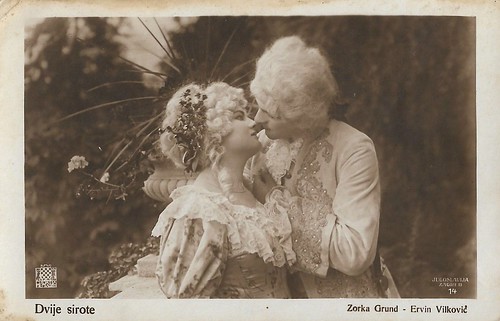
Former Kingdom of Serbs, Croatians and Slovenes postcard by Jugoslavija Film, Zagreb, no. 14. Zorka Grund in Dvije sirote/Dvije sirotice/The Two Orphans (Alfred Grünhut, 1919).
Zorka Kremzar, born Zorka Grund (1900-?), was a Croatian film actress. She was the daughter of Arnošt Grund, a director of the Czech origin, and sister of Milada Grund, who performed under the pseudonym of Milada Tana. Zorka Grund later became a filmmaker.
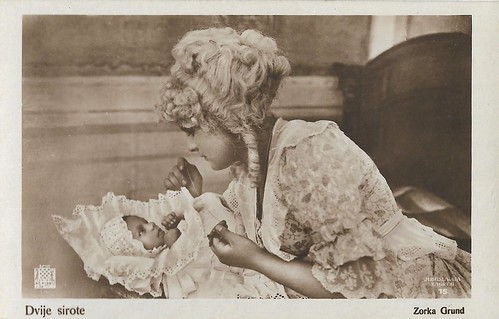
Former Kingdom of Serbs, Croatians and Slovenes postcard by Jugoslavija Film, Zagreb, no. 15. Zorka Grund in Dvije sirote/Dvije sirotice/The Two Orphans (Alfred Grünhut, 1919).
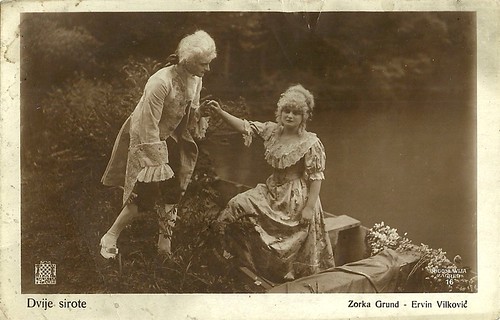
Former Kingdom of Serbs, Croatians and Slovenes postcard by Jugoslavija Film, Zagreb, no. 16. Zorka Grund and Ervin Vilkovic in Dvije sirote/Dvije sirotice/The Two Orphans (Alfred Grünhut, 1919).
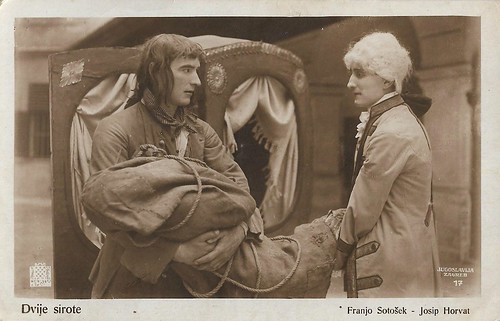
Former Kingdom of Serbs, Croatians and Slovenes postcard by Jugoslavija Film, Zagreb, no. 17. Franjo Stosek and Josip Horvat in Dvije sirote/Dvije sirotice/The Two Orphans (Alfred Grünhut, 1919).
Franjo Sotošek (1881-1945) was a Croatian actor. Under the pseudonym Franjo André he performed at the Zagreb National Theatre (1899-1900), then in the traveling company of D. Freudenreich. Between 1904 and 1938 he was a member of the Zagreb National Theatre.
Sources: Dejan Kosanovic (Kinematograija a i film u kraljevini shs/kraljevini Jugosviji 1918-1941 - Croatian), Mirror mmg, Hrvatska Enciclopedija (Croatian), Wikipedia (Croatian) and IMDb.

Former Kingdom of Serbs, Croatians and Slovenes (now Croatian) postcard by Jugoslavija Film, Zagreb, no. 7. August Cilić in Dvije sirote/Dvije sirotice/The Two Orphans (Alfred Grinhut a.k.a. Alfred Grünhut, 1919).
August Cilić (1891-1963), was a Croatian actor, comedian and director of the Croatian National Theatre in Zagreb, and the Croatian National Theatre in Varaždin.

Former Kingdom of Yugoslavia (now Croatian) postcards by Jugoslavija Film, Zagreb, no. 8. Arnošt Grund, Jovanka Jovanovic and Vlasta Dryak in Dvije sirote/Dvije sirotice/The Two Orphans (Alfred Grinhut a.k.a. Alfred Grünhut, 1919).
Tenor and actor Arnošt Grund (1866-1929) was born and educated in Prague. In 1895, Stjepan Miletić brought him to Zagreb. There, he fell in love with Croatian art, and remained in Zagreb until his death. Grund was a pioneer of the Croatian cinema, working as actor, screenwriter and director. Jovanka (Ivanka) Jovanović (born Dvorniković) (1887-1963) was a Serbian-Croatian actress. Vlasta Dryak (1911-2006) must have been just a child of 7 or 8 when she played in Dvije sirote. When she was 21 she became a stage actress and was successful at the Croatian National Theatre.

Former Kingdom of Yugoslavia (now Croatian) postcards by Jugoslavija Film, Zagreb, no. 9. Zorka Grund and Josip Pavic in in Dvije sirote/Dvije sirotice/The Two Orphans (Alfred Grinhut a.k.a. Alfred Grünhut, 1919).
Zorka Kremzar, born Zorka Grund (1900-?), was a Croatian film actress. She was the daughter of Arnošt Grund, a director of the Czech origin, and sister of Milada Grund, who performed under the pseudonym of Milada Tana. Zorka Grund later became a filmmaker, according to Croatian sources.
Josip Pavic (1887-1936), born in Trasnik (Bosnia and Herzegovina) was a stage actor, primarily performing at the Croatian National Theatre in Zagreb, Croatia, where his bronze bust is featured in the grand hall. While he was a renowned actor in many roles, his most famous role was as Hamlet. With other actors, he helped to build the 2nd instalment of the National Theatre, located in Split, Croatia. In 1919 Pavic acted in five silent films, among which Dvije sirote and Vragoljanka. In 1936 Pavic died in Zagreb from cirrhosis of the liver and heart failure. His funeral was attended by hundreds of his fans.

Former Kingdom of Yugoslavia (now Croatian) postcards by Jugoslavija Film, Zagreb, no. 10. Alfred Grünhut in Dvije sirote/Dvije sirotice/The Two Orphans (Alfred Grinhut a.k.a. Alfred Grünhut, 1919).
Alfred Grinhut or Alfred Grünhut (1882-1946) was a Croatian and Yugoslav actor and director, known as the author of two films lost today: Vragoljanka (1919) and Dvije sirote (1919), in which he also acted. He also acted in Brisem i sudim (Arnost Grund, 1919) and Dvorovi u samoci (Tito Strozzi, 1925) too.
The first Croatian film companies
As Croatian film historian Dejan Kosanovic indicates in his study Kinematografija i film i Kraljevini SHS/Kraljevini Jugoslaviji 1918-1941 (2011), domestic film production in Croatia started during the First World War.
In 1917, Hamilkar Bošković and Julien Bergmann founded the first Croatian film company, Croatia. They engaged Croatian actors and directors and Austrian technicians. The first Croatian film director was Joseph Halle, who made most of the films of the Croatia company. At the end of 1918 Bošković and Bergmann sold their rights to the new company Hermes or New Croatia, which was active until 1920.
Early 1919, Hamilkar Boskovic founded with Theodore Milic the company Jugoslavija Film. April 1919 Milic was in Paris and bought Pathé cameras and equipment. Among the film company members were three actors of the National Theatre, Alfred Grünhut, Tito Marquis Strozzi and Dragutin Horvat. Alfred Grünhut (1882-1946) had already directed two films and played in several other films of the former Croatia film company.
The first and very ambitious project of Jugoslavija Film was the film Brišem i sudim/B. and the judge, a grand melodrama for which the scenario was written in Slovenian and Croatian by theatre actor and director Ignjat (Ignatius) Borštnik (1858-1919), who also played the main role in the film. The director was Arnošt Grund (1866-1929), a Czech theatre actor and director who lived and worked in Zagreb since 1895, while the cameraman was one of the pioneers of the Austrian film Ljudevit Šašek (Ludwig Schaschek).
The scenographer for Brišem i sudim/B. and the judge was the Zagreb painter Otto Antonini (1849-1937), whom Jugoslavija engaged as a painter of sets and props. He also painted the decorations for film posters and for interiors in the films, and he produced the trademark of the company - three girls holding the coats of arms of Serbs, Croats and Slovenes.
As Brišem i sudim was successful, soon more films of Jugoslavija followed, such as Jeftina košta (Arnost Grund, 1919), based on a script by Grund and filmed by Schaschek, and U lavljem kavezu (1919), scripted and directed by Arnošt Grund. Jugoslavaija also distributed films by others, such as those by the Austrian company Sascha-Film.

Former Kingdom of Yugoslavia (now Croatian) postcards by Jugoslavija Film, Zagreb, no. 11. Milica Mihicic, Zorka Grund and Bogumila Vilhar in Dvije sirote/Dvije sirotice/The Two Orphans (Alfred Grinhut a.k.a. Alfred Grünhut, 1919).
Bogumila Vilhar (1882-1962) was a Croatian stage and screen actress. From 1905, she continuously acted at the Croatian National Theatre, apart from breaks at Osijek (1919-1921) and Split (1922-1924). She played in Shakespeare and Schiller classics and also in many plays by domestic authors. Vilhar is also known for the film Lisinski (Oktavijan Miletic, 1944), a biopic of Croatian composer Vatroslav Lisinski.
Milica Mihičić (1864-1950) first appeared on stage in 1890 in Zagreb, where she acted as an extraordinary actress for the following 50 years. At the beginning of her career she performed in various roles in dramas, ballet and operettas. She continued as an actress in French Salon prose theatre. Her second vocation was the psychological realistic drama. Mihičić appeared also in the film Dama sa crnom krinkom/The Lady with the Black Curse (1919).

Former Kingdom of Yugoslavia (now Croatian) postcards by Jugoslavija Film, Zagreb, no. 12. Jovanka Jovanovic and Vlasta Dryak in Dvije sirote/Dvije sirotice/The Two Orphans (Alfred Grinhut a.k.a. Alfred Grünhut, 1919).

Former Kingdom of Serbs, Croatians and Slovenes postcard by Jugoslavija Film, Zagreb, no. 13. Ivo Mirjev in Dvije sirote/Dvije sirotice/The Two Orphans (Alfred Grünhut, 1919).
Ivo Mirjev aka Ivan Mirjev and Ivan de Dominis-Mirjev (1894-1967) was a Croatian actor and theatre director.
Passion for adventure
Dvije sirote/The Two Orphans (Alfred Grünhut, 1919) is based on the 1874 French play Les deux orphelines and situated in the eighteenth century, shortly before the French Revolution. The orphan Henriette Gerard accompanies Louise, her blind adoptive sister, to Paris. The two girls hope to find a doctor who will cure Louise of her blindness. On the basis of the postcards, it seems that Zorka Grund played both Louise and Henriette.
Henriette is kidnapped by the Marquis de Presles, a rogue who decides to make her his toy. Louise is no more fortunate than her sister: left to herself, she falls into the hands of Madame Frochard, an alcoholic shrew who will constantly humiliate and torment her to force her to beg by singing in the streets.
The kind Chevalier de Vaudry in vain tries to help Henriette to find Louise again. Henriette is imprisoned, while Louise suffers equally on the streets, only helped by Pierre. The outbreak of the French Revolution aggravates the situation, and Henriette and Vaudry risk to die under he guillotine. In the end all will be saved: Louise will cured from her blindness, while Henriette can marry Vaudry.
During only two years, 1919 and 1920, Jugoslavija produced 9 documentaries films, 11 special issues and 5 feature films, but apparently faced financial difficulties, so it transformed into a joint stock company in order to attract more stockholders and increase capital. The two founders were replaced by Marcel Kolin. He expanded the company, opened offices in Split and Belgrade (1922), and even a film academy (also 1922).
However, Jugoslavija's sixth and last feature film was Strast za pustolovinama/Passion for adventure (1922) by the Russian director Aleksandar Aleksandrovič Vereščagin and scripted possibly by Josip Halle. Local distributors and cinema owners by then were more interested in foreign films. The shareholders of Jugoslavija backed out in 1922, so the company went bankrupt in 1923. Without help of the state, the young Croatian cinema petered out.

Former Kingdom of Serbs, Croatians and Slovenes postcard by Jugoslavija Film, Zagreb, no. 14. Zorka Grund in Dvije sirote/Dvije sirotice/The Two Orphans (Alfred Grünhut, 1919).
Zorka Kremzar, born Zorka Grund (1900-?), was a Croatian film actress. She was the daughter of Arnošt Grund, a director of the Czech origin, and sister of Milada Grund, who performed under the pseudonym of Milada Tana. Zorka Grund later became a filmmaker.

Former Kingdom of Serbs, Croatians and Slovenes postcard by Jugoslavija Film, Zagreb, no. 15. Zorka Grund in Dvije sirote/Dvije sirotice/The Two Orphans (Alfred Grünhut, 1919).

Former Kingdom of Serbs, Croatians and Slovenes postcard by Jugoslavija Film, Zagreb, no. 16. Zorka Grund and Ervin Vilkovic in Dvije sirote/Dvije sirotice/The Two Orphans (Alfred Grünhut, 1919).

Former Kingdom of Serbs, Croatians and Slovenes postcard by Jugoslavija Film, Zagreb, no. 17. Franjo Stosek and Josip Horvat in Dvije sirote/Dvije sirotice/The Two Orphans (Alfred Grünhut, 1919).
Franjo Sotošek (1881-1945) was a Croatian actor. Under the pseudonym Franjo André he performed at the Zagreb National Theatre (1899-1900), then in the traveling company of D. Freudenreich. Between 1904 and 1938 he was a member of the Zagreb National Theatre.
Sources: Dejan Kosanovic (Kinematograija a i film u kraljevini shs/kraljevini Jugosviji 1918-1941 - Croatian), Mirror mmg, Hrvatska Enciclopedija (Croatian), Wikipedia (Croatian) and IMDb.
No comments:
Post a Comment